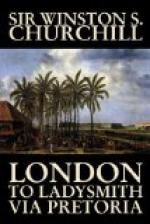Under the pressure of the advancing and enveloping army this degenerated very rapidly. When the Dutchman makes up his mind to go he throws all dignity to the winds, and I have never seen an enemy leave the field in such a hurry as did these valiant Boers who found their flank turned, and remembered for the first time that there was a deep river behind them. Shortly after twelve o’clock the summit of the ridge of Monte Cristo was in our hands. The spurs which started at right angles from it were, of course, now enfiladed and commanded. The Boers evacuated both in great haste. The eastern spur was what I have called the ‘turned-back’ position. The Cavalry under Dundonald. galloped forward and seized it as soon as the enemy were seen in motion, and from this advantageous standpoint we fired heavily into their line of retreat. They scarcely waited to fire back, and we had only two men and a few horses wounded.
The spur on the Colenso or western side was none other than the Green Hill itself, and judging rightly that its frowning entrenchments were now empty of defenders Sir Redvers Buller ordered a general advance frontally against it. Two miles of trenches were taken with scarcely any loss. The enemy fled in disorder across the river. A few prisoners, some wounded, several cartloads of ammunition and stores, five camps with all kinds of Boer material, and last of all, and compared to which all else was insignificant, the dominating Monte Cristo ridge stretching northward to within an easy spring of Bulwana Hill, were the prize of victory. The soldiers, delighted at the change of fortune, slept in the Boer tents—or would have done had these not been disgustingly foul and stinking.
From the captured ridge we could look right down into Ladysmith, and at the first opportunity I climbed up to see it for myself. Only eight miles away stood the poor little persecuted town, with whose fate there is wrapt up the honour of the Empire, and for whose sake so many hundred good soldiers have given life or limb—a twenty-acre patch of tin houses and blue gum trees, but famous to the uttermost ends of the earth.
The victory of Monte Cristo has revolutionised the situation in Natal. It has laid open a practicable road to Ladysmith. Great difficulties and heavy opposition have yet to be encountered and overcome, but the word ‘impossible’ must no longer be—should, perhaps, never have been used. The success was won at the cost of less than two hundred men killed and wounded, and surely no army more than the Army of Natal deserves a cheaply bought triumph.




